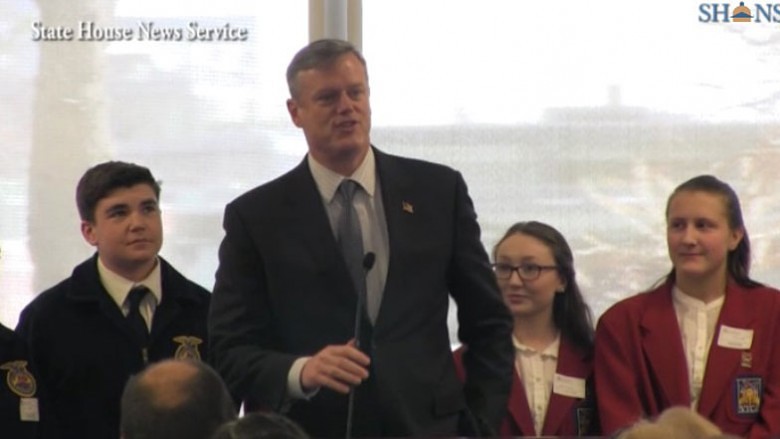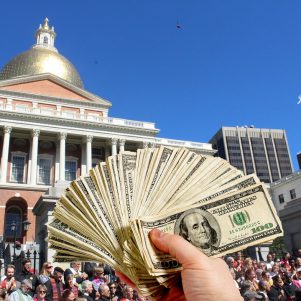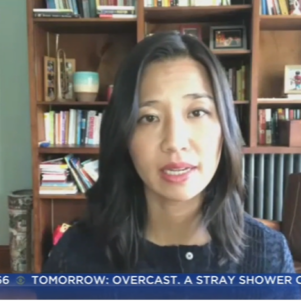Baker looking to bolster voc-tech schools in budget, jobs bill
By State House News Service | January 22, 2016, 15:09 EST
 (Screenshot via SHNS)
(Screenshot via SHNS) BOSTON — Gov. Charlie Baker proposed an additional $83.5 million for vocational education Friday, including a $75 million five-year capital program in a jobs bill set to be filed next week and an additional $8.5 million in his annual budget.
Both of Baker’s initiatives would need to pass through the Legislature in a time of tight finances.
“It’s an area we clearly want to make investments in,” Baker said at the Federal Reserve Bank of Boston on Friday, saying boosting vocational education is “a huge opportunity for us.”
The governor’s proposed $75 million in capital money would finance grants for school equipment and expansion, while the $8.5 million proposed for the budget would fund grants for “school-to-career connecting activities,” and $1 million in technical partnership grants supported by federal Perkins Act grants.
“We figured that was at least the right place to start,” Baker said about the $75 million in capital funding that he mentioned in his State of the Commonwealth address Thursday. “If that turns out to be too much, OK.”
Worcester Regional Chamber of Commerce President Tim Murray, who toured 64 vocational-technical and agriculture education programs when he was lieutenant governor, said there are “at least” 3,000 people waiting to get into vocational programs.
“Did you really visit 63?” Baker asked Murray at one point at the Fed event.
“Sixty four,” Murray corrected him.
A study released Friday in conjunction with Friday’s event found waiting lists of 3,200 applicants with the longest lists in Brockton, Fall River, Fitchburg, Lawrence, Lowell, New Bedford, Peabody, Salem, Springfield and Worcester, and reported that one third of the state’s cities and towns are not served by vocational education.
“The voc-tech schools have oftentimes been forgotten in the educational debate in Massachusetts,” Murray told the News Service. He said “the single biggest need” of the business community “regardless of the size of the company, regardless of the sector” is a “pipeline” of available workers.
The study produced by the Kitty and Michael Dukakis Center for Urban and Regional Policy reported that the dropout rate at vocational schools is 0.7 percent, “nearly one-third” of traditional public high schools, and special education students’ graduation rates are 20 percent higher at regional vocational schools.
A group of business associations and others on Friday announced the formation of the Alliance for Vocational and Technical Education, bringing together organizations as varied as the blue chip Massachusetts Competitive Partnership, the interfaith Massachusetts Communities Action Network, and think tanks Pioneer Institute and MassINC. That new group commissioned the report produced by the Dukakis Center.
“What may also be leading to increased demand for vocational schools is the rising cost of post-secondary school, which puts added pressure on students to acquire skills that lead to good jobs at decent wages,” read the report by Catherine Tumber, Barry Bluestone, Don Walsh and James Huessy. The report found that vocational schools are about 50 percent more expensive to run than traditional schools because of the need for up-to-date equipment, and the regional funding structure puts regional vocational schools in a “fiscal straightjacket” as they compete for dollars against local public schools.
Local school districts are already feeling a strain in many places as state funding follows students into charter schools – an issue where Baker and many lawmakers in the Democrat-dominated Legislature have differing opinions.
A survey included in the Dukakis Center study found 90 percent of employers see a need to increase the number of vocational high school graduates, and 96 percent of parents had a favorable opinion of the vocational program their children attend.
Education Secretary James Peyser said the grants would “upgrade and modernize programs” and help schools to “meet the needs” of employers.
Murray singled out Worcester Technical High School, where President Barack Obama visited in 2014, and Assabet Valley Regional Technical High School, which he said has a successful after-school program.
— Written by Andy Metzger
Copyright State House News Service










